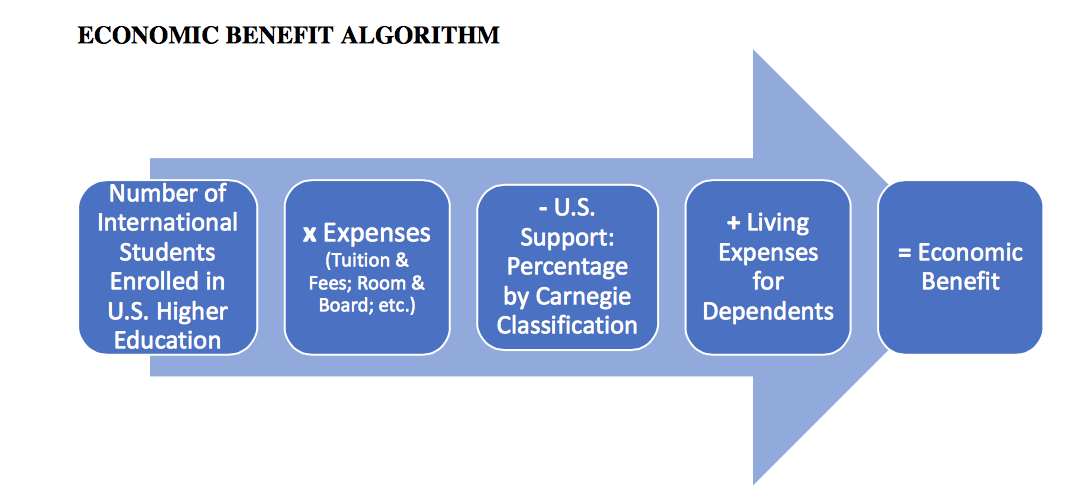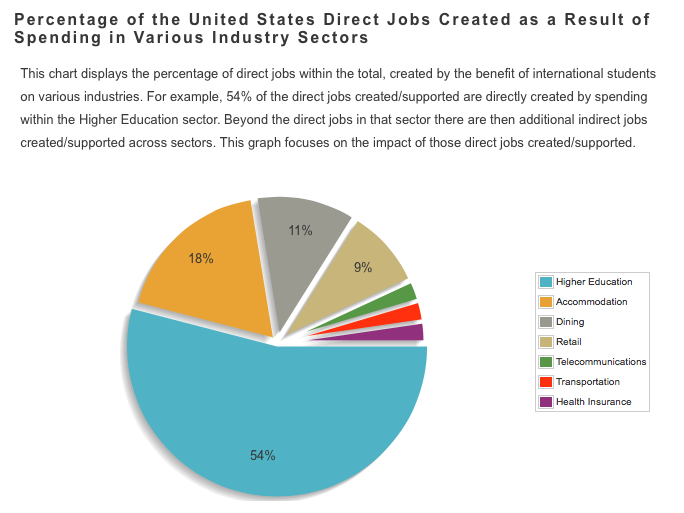As I am writing this is, I am following the Institute of International Education launch of the Open Doors International Student report via Periscope! The report is a yearly affair that chronicles data on incoming and outgoing students for the United States of America.
Generally, international students have increased, both in- and outbound. And it is expected to double in the next 10 years! Inside Higher Ed has summarised the report.
One of the outstanding facts from this year’s report is the NAFSA tool that takes a stab at calculating the gains of international students (likely significant as the State Department funds the Open Doors reports…) and comes up with the number of $30,5 billion as well as 135000 direct jobs and 238 indirect jobs from the same 975000 international students.
Looking a bit closer at this data, the economic benefit includes tuition and living expenses.

Jobs are reported from the following sectors: higher education, accommodation, dining, retail, telecommunications, transportation and health insurance, see distribution below.
It is important international students are described as a positive, as most of them are financed by themselves or family, however I think the NAFSA tool could be more generous and include also innovation gains in the financial model, as well as entertainment and state jobs (diplomatic officers etc) for the benefitting job sectors.
I wish the Open Doors report was replicated by Association of African Universities for Africa as the Americans have showed that international students come with wealth, and attracting them is beneficial both in terms of direct finances and jobs. And, do I dare say, innovation and possibly even more?
Tables from NAFSA.
Read more on my research on Ghanaian student migration aspirations.





















 This week, my department, the
This week, my department, the  Earlier speakers have been Dr. Ernesto Zedillo, former president of Mexico (2012), Prof. Wole Soyinka (2007) , but I can’t find a proper list of them all…Anyway, Mkandawire is originally from Malawi, but has lived and worked all over the world, notably for the UN (for its Research Institute on Social Development), CODESRIA (organization for African Universities), and at universities in UK, Zimbabwe and even Sweden! I have come across his work on the past and future of universities in Africa, as it is a topic that interests me. So I am looking forward to this lecture series! As this was not enough, I have gotten interesting reactions to that he is lecturing in Ghana: “he is fun/wild/crazy” is often said, so now my hopes are even higher!
Earlier speakers have been Dr. Ernesto Zedillo, former president of Mexico (2012), Prof. Wole Soyinka (2007) , but I can’t find a proper list of them all…Anyway, Mkandawire is originally from Malawi, but has lived and worked all over the world, notably for the UN (for its Research Institute on Social Development), CODESRIA (organization for African Universities), and at universities in UK, Zimbabwe and even Sweden! I have come across his work on the past and future of universities in Africa, as it is a topic that interests me. So I am looking forward to this lecture series! As this was not enough, I have gotten interesting reactions to that he is lecturing in Ghana: “he is fun/wild/crazy” is often said, so now my hopes are even higher!